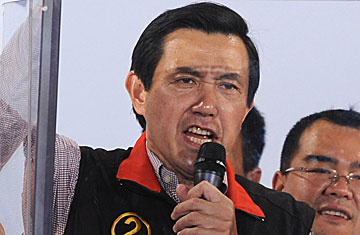
Kuomintang Party candidate Ma Ying-jeou, winner of the Taiwan presidential election, delivers his address outside the KMT headquarters in Taipei on March 22, 2008.
Ma Ying-jeou, the new President of Taiwan, has been handed a mandate to radically alter his country's relationship with China in a way that can potentially redraw the political map of east Asia.
Ma, 57, of the Kuomintang, or KMT, won Taiwan's presidential election by a landslide, garnering 58% of the votes cast compared to 42% for his chief rival, Frank Hsieh of the rival Democratic Progressive Party, or DPP. "The end of this election is the beginning of change," Ma said in his victory address to a roaring crowd in Taipei.
A main plank of Ma's campaign platform is to improve ties with Taiwan's chief rival, China. The two separated in 1949 after Mao Zedong's Communists were victorious in a civil war with the KMT, which fled to the island of Taiwan and set up its own government. Beijing and Taipei have engaged in a military standoff ever since and the heavily armed strait that separates them remains one of Asia's hottest potential flashpoints. China still sees Taiwan as a runaway province and claims sovereignty over the island to this day.
Ma, however, is proposing a wide-ranging program aimed at greatly reducing tensions between the two countries. He wants to expand Taiwan's economic ties with China by launching direct transportation links, lifting restrictions on Taiwan businessmen operating in China and opening Taiwan to Chinese tourists and investors. Ma, a Harvard-trained lawyer, also broaches the idea of setting in place "confidence-building measures" to scale back the military build-up along the Taiwan Strait. "The more we open ourselves up," Ma recently told TIME, "the more we interact with the mainland, the chances of war will be less."
The scale of Ma's victory — he won by the largest margin in Taiwan's electoral history — provides him with the public backing to pursue his agenda with gusto. His mandate is a repudiation of the DPP's preference for a more distant relationship with China. Though Hsieh also favored expanding ties with China, the DPP and its supporters are far more wary of China and fear absorption by their giant neighbor. During the campaign, Hsieh attempted to paint Ma's plans as a route toward de facto unification. In the days before the vote, he tried to capitalize on Beijing's crackdown on anti-Chinese protests in Tibet by suggesting Taiwan could face the same end. "As we look at Tibet, we must think about our own fate," Hsieh said. The approach echoed that of Ma's predecessor, outgoing DPP President Chen Shui-bian, who pursued a series of policies aimed at bolstering Taiwan's sense of independence.
However, Chen's actions irritated Beijing, whose leaders are highly sensitive to any challenge to their claims over the island, and, in the eyes of many in Taiwan, further isolated the country from the rest of Asia politically and economically. Businessmen hope that Ma's policies will help boost an economy that has struggled to provide jobs and improve the standard of living of Taiwan's 23 million people by allowing them to take fuller advantage of a high-growth Chinese market. Ma's victory will also be welcomed in Washington. He has vowed to repair Taipei's relationship with the U.S., which has come under strain due to Chen's combative stance toward China.
The big question, however, is: Will Beijing play ball with Ma? China does seem to be in an unusually cooperative mood. In early March, China's President Hu Jintao reiterated Beijing's willingness to negotiate a peace treaty with Taiwan. Yet Ma's likely willingness to offer concessions to Beijing will force Hu to make tough decisions regarding China's stand toward Taiwan, which he has so far been able to avoid, and it remains unclear to what extent he is open to cooperating with Taipei.
